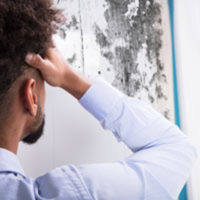MENU
- Home
- Overview
- Attorneys
- Practice Areas
- Firm News
- Blog
- Contact
 Like all buildings, rental properties are susceptible to mold contamination. Landlords should check their buildings for mold regularly and immediately resolve any mold issues detected. Not only does mold remediation protect their investment from the damage caused by mold growth, but it also protects landlords from claims of negligence, as the health risks to tenants could be the basis for a lawsuit.
Like all buildings, rental properties are susceptible to mold contamination. Landlords should check their buildings for mold regularly and immediately resolve any mold issues detected. Not only does mold remediation protect their investment from the damage caused by mold growth, but it also protects landlords from claims of negligence, as the health risks to tenants could be the basis for a lawsuit.
Mold is a fungus that grows in warm, damp spaces and can be toxic to humans. Common molds can be found growing on old cheese or in moist environments, such as in shower curtains. However, these types of mold are not dangerous. Other types of mold, such as stachybotrys, penicillium, aspergillus, paecilomyces, and fusarium can cause harm to people if they are ingested, inhaled, or even touched. Molds can be black, white, green, or gray. They may be powder-like or shiny and can grow in plain sight or hidden from view.
Dangerous mold may grow anywhere that is damp, but often it becomes a problem when it grows undetected in walls and ceilings, under floors, or in basements or attics. The main factor that makes an area mold prone is the amount of moisture present.
Exposure to mold can cause health issues that range from mild and uncomfortable allergy-like symptoms to more severe and lasting health conditions. Common symptoms associated with mold include:
Mold can also be responsible for serious health conditions, such as Chronic Inflammatory Response Syndrome, which is associated with its own serious symptoms, including:
A person with prolonged exposure to the chemicals produced by certain types of mold may develop mycotoxin toxicity, a condition that causes permanent neurological damage.
Under the law, a landlord’s property maintenance obligation involves repairing leaking pipes, windows, and roofs. If leaks are left unresolved, mold may result. Even in cases where the tenant created the conditions that allowed mold to accumulate, the law holds landlords responsible for remediating the problem. This is usually true, despite a mold clause that may exist in the rental agreement or lease.
Even if your state does not have rental laws that specifically pertain to mold, all landlords are responsible to provide safe and livable housing. The presence of dangerous mold can violate this basic law. If a tenant neglects to keep humidity and cleanliness in check, they may be at fault for creating a mold-friendly environment that may hurt their case against their landlord. Ultimately, landlords and tenants should work together to keep their property free of mold.
If you or a loved one suffered from exposure to toxic mold, contact the experienced Delaware toxic mold lawyers at Jacobs & Crumplar, P.A. Call us at 302-656-5445 or contact us online to schedule a free consultation. With offices in Wilmington and Georgetown, Delaware, we represent clients in Dover, New Castle County, and Sussex County.